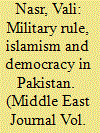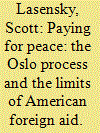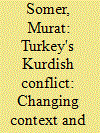| Srl | Item |
| 1 |
ID:
051843


|
|
|
|
|
| Publication |
Spring 2004.
|
| Summary/Abstract |
Iran's interwoven and complex domestic political structures should be set against an equally complex, dynamic, and unstable regional system, if one is to understand fully the relationship between the domestic and regional forces governing Iran's foreign policy-making. These matters are addressed in this article in the context of the new regional realities created by the fall of the Iraqi regime in April 2003
|
|
|
|
|
|
|
|
|
|
|
|
|
|
|
|
| 2 |
ID:
051844


|
|
|
|
|
| Publication |
Spring 2004.
|
| Summary/Abstract |
Pakistan's politics has been shaped by the dynamics of civilian-military relations and Islamism's relation to the state. This has created an ongoing negotiation for power in which the military, civilian politicians, and Islamist forces have individually and in alliance with one another vied for control of Pakistan's politics. General Pervez Musharraf's regime has been no exception to this trend. As its claim to secular military rule proved untenable, it has turned to rely on Islamist forces to manage civilian-military relations.
|
|
|
|
|
|
|
|
|
|
|
|
|
|
|
|
| 3 |
ID:
051847


|
|
|
|
|
| Publication |
Spring 2004.
|
| Summary/Abstract |
Dhufar, the southern region of the Sultanate of Oman, displays a tremendous diversity in its social structure, rather surprising for an area so small. While the people of the coastal plain and the inland Najd are Arabic-speaking, the mountain highlands of the region are home to various non-Arabic speaking communities. Brief descriptions of these communities are provided, as well as of other non-Arabic-speaking groups that seem to have originated in Dhufar but have moved into the northeastern deserts. Unlike the case in northern Oman, the principal boundaries of Dhufar's ethnic groups lie in language; but, as social change accelerates, this distinction may well disappear in the not-too-distant future. The Dhufar War of the 1960s and 1970s, as well as Oman's socioeconomic change since 1970, have increased physical and social mobility and blurred traditional social distinctions.
|
|
|
|
|
|
|
|
|
|
|
|
|
|
|
|
| 4 |
ID:
051845


|
|
|
|
|
| Publication |
Spring 2004.
|
| Summary/Abstract |
American foreign aid has been essential for both cementing and sustaining efforts to resolve the Arab-Israeli conflict since the 1970s. During the Oslo process, aid was designed primarily to build public constituencies to support the negotiations. However, aid quickly became a bandage for a deteriorating Palestinian economy weighed down by corruption, damaged by violence, and stifled by Israeli closures. Rather than serve its original purpose, aid became a crutch for an unsteady process that collapsed following the 2000 Camp David summit. Unlike in other Arab-Israeli negotiations, where aid has been more effective, the Oslo process highlights the limits of foreign aid as an instrument of statecraft
|
|
|
|
|
|
|
|
|
|
|
|
|
|
|
|
| 5 |
ID:
051846


|
|
|
|
|
| Publication |
Spring 2004.
|
| Summary/Abstract |
This article develops new analytical categories that are necessary to analyze Turkey's Kurdish conflict in its changed domestic and international environments and to evaluate the policy options. If Turkish state policies and discourse, and that of the other regional and international actors, signal to Kurds that the Turkish and Kurdish identities are mutually exclusive categories with rival interests, radical shifts may occur in Turkish Kurds' social and political identities and preferences. If state policies promote these identities as complements with compatible interests, radical shifts are unlikely and Turkey can play a more constructive regional role.
|
|
|
|
|
|
|
|
|
|
|
|
|
|
|
|